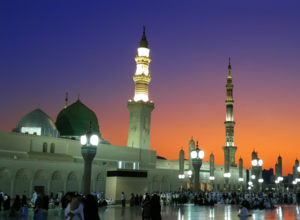 Sha’bān, the eighth Islamic month is second only to Ramadān in virtue, blessings and greatness. It is due to this virtue and greatness that the Prophet (Allah’s peace be upon him) used to emphasize its importance not only verbally but practically too.
Sha’bān, the eighth Islamic month is second only to Ramadān in virtue, blessings and greatness. It is due to this virtue and greatness that the Prophet (Allah’s peace be upon him) used to emphasize its importance not only verbally but practically too.
‘Ā’ishah (Allah be pleased with her) narrates, “The Messenger of Allah (Allah’s peace be upon him) used to fast till we would say that he would never stop fasting and he would abandon fasting till we would say that he would never fast. I never saw The Messenger of Allah (Allah’s peace be upon him) fasting for a whole month except the month of Ramadān and did not see him fasting in any month more than in the month of Sha’bān.” (Bukhārī, Muslim, Abū Dāwūd, Nasa’ī)
‘Ā’ishah (Allah be pleased with her) narrates, “The Messenger of Allah (Allah’s peace be upon him) used to fast the (whole) month of Sha’bān except for a few days.” (An-Nasa’ī)
Usāmah (Allah be pleased with him) asked, “O The Messenger of Allah! I do not see you fasting in any month as much as in Sha’bān.” He replied, “It is a month people are negligent of between Rajab and Ramadān. It is a month in which deeds are raised towards the Lord of the worlds. Therefore, I like my deeds to be raised whilst I am fasting.” (An-Nasa’ī)
Also Read: Verses of the Universe in Gaza: The Unyielding Light of Faith
The Fifteenth of Sha’bān
Amongst the days and nights of Sha’bān, there is one night called Laylat-al-Barā’at or Shabe Barā’at (the Night of Liberation), a night noted for its great blessings and virtues. The Glorious Qur’ān describes it as the blessed night.
Lo! We revealed it on a blessed night. (44:3)
Also Read: Prophet Sulaiman Alaihi Salam, the Greatest Muslim King of All Time
According to ‘Ikrimah (Allah be pleased with him) and a group of commentators of the Quran, the ‘blessed night’ referred to in this verse is the fifteenth night of Sha’bān.
Fortunate indeed are those who attain the full blessings and benefits of this night by spending it in performing good and refraining from evil. One must strive his utmost to attend to ‘ibādah (worship) in this auspicious night as this night indeed is a great favour of Allāh Most High for the believers. There are a number of ahādīth in regard to this night.
(1) ‘Alī (Allah be pleased with him) narrates that The Messenger of Allah (Allah’s peace be upon him) said, “When it is the fifteenth of Sha’bān, then stand (in worship) at night and fast during the day. Because Allāh Most High descends in this night at sunset to the first heaven and says: ‘Is there any seeker of forgiveness, that I may forgive him? Is there any seeker of sustenance, that I may sustain him? Is there anyone in affliction, that I may remove his affliction? Is there anyone like this, like that (and so on)’. This continues until Fajr.” (Ibn Mājah)
(2) Abū Mūsā Al-Ash’arī (Allah be pleased with him) narrates that the Messenger of Allāh (Allah’s peace be upon him) said, “In the fifteenth night of Sha’bān, Allāh Most High manifests and forgives all His creation except for the Mushrik (idolater) and the spiteful.” (Ibn Mājah)
Also Read: Imaam Yakhsyallah Mansur: Surah At-Tin Indicates the Command to Liberate Al-Aqsa
(3) ‘Ā’ishah (Allah be pleased with her) narrates: “The Messenger of Allāh (Allah’s peace be upon him) came to me (one night) and took off his clothes, but he had hardly sat down when he got up again, put on his clothes and left. A strong ghayrah (sense of honor and self-respect) overtook me as I thought he was going to one of his other wives. I followed him and found him in the graveyard of Baqī’ seeking forgiveness for believing men and women and the martyrs. I said (to myself), ‘May my parents be sacrificed for you. You, (the Prophet) are in want of your Lord and I am in want of the world.’
I returned to my room (quickly) and I was breathless. The Prophet (Allah’s peace be upon him) arrived shortly and said, ‘Why are you breathless, O ‘Ā’ishah?’ I said, ‘May my parents be sacrificed for you. You came to me and took off your clothes, but you had hardly sat down when you got up and put on your clothes (and left). A strong ghayrah overtook me and I thought you were going to one of your (other) wives until I saw you in (the graveyard of) Baqī’ doing whatever you were doing.’
He said, ‘O ‘Ā’ishah! Did you fear that Allāh and his Messenger will treat you with injustice? Jibra’īl came to me and said, ‘This night is the fifteenth night of Sha’bān. Allāh sets free from Hell during this night, souls equivalent to the hair (and wool) of the goats of Banī Kalb.’ (Banī Kalb possessed the largest number of goats in the Arabian Peninsula.)
‘However, Allāh will not look (with mercy) even on this (auspicious) night towards idolaters, one who harbors ill-will against his fellow beings, one who cuts himself off from his near relatives, one who dangles his clothes over his ankles, one disobedient to parents and a habitual drunkard.’”
Also Read: Imaam Yakhsyallah: Nurture Love for the Prophet, One Will Be with Whom One Loves
‘Ā’ishah (Allah be pleased with her) says, “He took off his clothes, then said, ‘O ‘Ā’ishah! Will you permit me to spend this night in worship.’ I replied, ‘Certainly. May my parents be sacrificed for you.’ The Prophet (Allah’s peace be upon him) got up and remained in sajdah (prostration) for a very long time until I thought he had passed away. I got up to inquire and placed my hand on his feet to feel that he was alive, thus I became happy. I heard him say in his prostration:
اللَّهُمَّ إِنِّي أَعُوذُ بِعَفْوِكَ مِنْ عِقَابِكَ , وَأَعُوذُ بِرِضَاكَ مِنْ سَخَطِكَ , وَأَعُوذُ بِكَ مِنْكَ , لا أُحْصِي ثَنَاءً عَلَيْكَ أَنْتَ كَمَا أَثْنَيْتَ عَلَى نَفْسِكَ
‘I take refuge of Your forgiveness from Your punishment. I take refuge of Your pleasure from Your anger. I take refuge from You. Great is Your eminence. I cannot praise You (as You are worthy of praise). Your eminence is exactly as You have praised yourself.’
In the morning I mentioned these words to him. He said, ‘O ‘Ā’ishah! Learn them and teach them (to others) because Jibra’īl taught me and ordered me to repeat them over and over again in sajdah.’” (Al-Bayhaqī)
Also Read: Friday Sermon: Emulating the Firmness of the Prophet in Struggle
Note: Muftī Taqī ‘Uthmānī (Allah protect him) states: “Although the chain of narrators of some of these traditions suffers with some minor technical defects, yet when all these traditions are combined together, it becomes clear that this night has some well founded merits, and observing this night as a sacred night is not a baseless concoction as envisaged by some modern scholars who, on the basis of these minor defects, have totally rejected giving any special importance to this night. In fact, some of these traditions have been held by some scholars of hadīth as authentic and the defects in the chain of some others have been treated by them as minor technical defects which, according to the science of hadīth, are curable by the variety of their ways of narration. That is why the elders of the Ummah have constantly been observing this night as a night of special merits and have been spending it in worship and prayers.”
The Fast of the Fifteenth
The fast of the 15th of Sha’bān can only be derived from a hadīth that has a weak narrator in the chain of narration, due to which it cannot be relied upon in the matter of the injunctions of Sharī’ah. Thus, the fast of the 15th of Sha’bān cannot be termed as Sunnah or Mustahab in the strict sense of the term. Nevertheless the fast could be kept without taking it as a Sunnah or Mustahab considering other factors such as:
Also Read: Imaam Yakhsyallah: Muslims Unity as Key to Victory of Islam
a) The fasts of the first half of Sha’bān have special merits as can be seen from the practice of the Prophet (Allah’s peace be upon him);
b) The virtues of the fasts of Ayyām-al-Bīd (i.e. 13th, 14th and 15th of the Islamic month) have been mentioned in the ahādīth.
Recommended Deeds
Also Read: Friday Sermon: Prophet Muhammad Is Not a Political Figure
The following practices are derived from the traditions of the Prophet (Allah’s peace be upon him) which have been mentioned above for Sha’bān and its virtuous 15th night.
(1) It is desirable that one fasts in the month of Sha’bān as much as one can. However, if fasting in Sha’bān is going to affect the fasting of Ramadān then one should refrain from it.
(2) Although salāh should be performed in Jamā’ah (congregation) everyday, on this auspicious night, one must participate with deep and solemn care in the Maghrib, ‘Ishā and Fajr Salāh.
(3) Spend as much time of the night as possible in worship individually. No specific du’ā or method of worship has been prescribed. One may engage in dhikr, recitation of the Qur’ān, salāh, learning and teaching or any other form of ‘ibādah. However, one must refrain from worldly talk and wasting of time. If ‘ibādah is not possible then at least avoid all sinful and useless acts and go to bed as soon as possible.
Also Read: Without Knowledge, Congregation Is Merely a Crowd Without Direction
(4) In one hadīth it has been mentioned that The Messenger of Allah (Allah’s peace be upon him) visited the graveyard of Baqī’. However, one may not establish the practice to be Sunnah as there is no mention of The Messenger of Allah (Allah’s peace be upon him) making it a general practice of this night. Hence, if one visits the graveyard once in a while it will be permissible.
One must refrain in particular from all those practices that are contrary to the Sunnah. Many of us deprive ourselves of the blessings of such auspicious moments and the Favours of Allāh Most High by following those customary acts which have no basis in the Qur’ān and Sunnah.
May Allāh Most High guide us all on the straight path and enlighten us with the blessings of this sacred month and its blessed night. Āmīn.(RE1/RS5)
Mi’raj Islamic News Agency (MINA)
Also Read: Friday Sermon: Grateful for Indonesia’s Independence by Supporting Palestine’s Freedom






























 Mina Indonesia
Mina Indonesia Mina Arabic
Mina Arabic